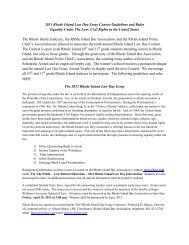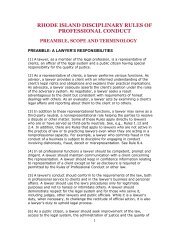Are We Taking The Sex Offender Label Too Far? - Rhode Island Bar ...
Are We Taking The Sex Offender Label Too Far? - Rhode Island Bar ...
Are We Taking The Sex Offender Label Too Far? - Rhode Island Bar ...
Create successful ePaper yourself
Turn your PDF publications into a flip-book with our unique Google optimized e-Paper software.
Criminal Consequences of Sending<br />
False Information on Social Media<br />
John R. Grasso, Esq.<br />
Law Office of John R.<br />
Grasso, Inc.<br />
Brandon Fontaine<br />
Roger Williams University<br />
School of Law 3L & Law<br />
Review Articles Editor<br />
If you used a computer in<br />
<strong>Rhode</strong> <strong>Island</strong> during the<br />
last 20 years, chances are<br />
you’re a criminal because<br />
<strong>Rhode</strong> <strong>Island</strong>’s computer<br />
crimes law makes it a crime<br />
to transmit untruthful or<br />
exaggerated statements.<br />
If you used a computer in <strong>Rhode</strong> <strong>Island</strong> during<br />
the last 20 years, chances are you’re a criminal<br />
because <strong>Rhode</strong> <strong>Island</strong>’s computer crimes law –<br />
Section 11-52-7(b) of the <strong>Rhode</strong> <strong>Island</strong> General<br />
Laws – makes it a crime to transmit untruthful<br />
or exaggerated statements.<br />
Specifically, the use of a computer to knowingly<br />
transmit any false information is chargeable<br />
as a criminal offense. Knowingly posting a<br />
lie on Facebook, or any other social media, is a<br />
crime in <strong>Rhode</strong> <strong>Island</strong> punishable by up to one<br />
year in prison. Emailing information you know<br />
not be true is a crime in <strong>Rhode</strong> <strong>Island</strong>. Sending<br />
a knowingly false text message is unlawful.<br />
Section 11-52-7(b) makes what are everyday<br />
occurrences misdemeanor crimes.<br />
Would the police investigate and charge a<br />
person with lying on Facebook? Would the<br />
police issue subpoenas, secure search warrants,<br />
and use special technology to track down a liar<br />
on Facebook? Would the State charge that liar?<br />
Would the court convict and sentence him? If<br />
the suspect was a police officer, and he purposely<br />
created a Facebook page identifying the<br />
Facebook profile as that of his police chief, the<br />
answer to every one of these questions is yes.<br />
Even if the suspect published facts on the alleged<br />
user’s profile so laughable that every person<br />
who saw the profile knew it was a joke, the<br />
State of <strong>Rhode</strong> <strong>Island</strong> would hunt him down,<br />
arrest, prosecute, and sentence him. This actually<br />
happened in one recent <strong>Rhode</strong> <strong>Island</strong> case<br />
charged under the statute.<br />
Is it really criminal conduct to create a parody<br />
profile on Facebook, a popular<br />
social networking website, where the<br />
suspected wrongdoer intentionally misspelled<br />
his chief’s first and last name,<br />
listed fictitious interests to include<br />
“Haiti, SpongeBob SquarePants,<br />
Milking Cows, Quilting, Sewing,<br />
Music, Police officers, and Reggae,” so<br />
that it was clear from the reactions of<br />
his friends that the profile was a joke? 1<br />
Yes. Following his arrest, the officer<br />
was charged under the Computer<br />
Crimes chapter of the <strong>Rhode</strong> <strong>Island</strong><br />
General Laws with violating section<br />
11-52-7(b) for “transmitting false data,” specifically<br />
false data relating to his chief, “with the<br />
knowledge that it was false.” Section 11-52-7(b)<br />
states that:<br />
Whoever intentionally or knowingly:<br />
1) makes a transmission of false data; or<br />
2) makes, presents or uses or causes to be<br />
made, presented or used any data for any<br />
other purpose with knowledge of its falsity,<br />
shall be guilty of a misdemeanor and shall<br />
be subject to the penalties set forth in § 11-<br />
52-5. 2<br />
“Data,” as used within the statute, is further<br />
defined as:<br />
…any representation of information, knowledge,<br />
facts, concepts, or instructions which<br />
are being prepared or have been prepared<br />
and are intended to be entered, processed,<br />
or stored, are being entered, processed, or<br />
stored or have been entered, processed, or<br />
stored in a computer, computer system, or<br />
computer network. 3<br />
While individuals often do not conduct<br />
themselves in a socially acceptable manner,<br />
criminal prosecution is not always warranted. 4<br />
In this case, by criminally charging the police<br />
officer with “transmitting false data,” the State<br />
violated his First Amendment freedom of<br />
expression because the statute is unconstitutionally:<br />
1) overbroad; 2) vague; 3) content-based;<br />
and, at the end of the day, the alleged wrongdoer’s<br />
publication is nothing more than a parody.<br />
Overbreadth<br />
“<strong>The</strong> overbreadth doctrine arises when a<br />
statutory enactment is so broad in its sweep<br />
that it is capable of reaching constitutionally<br />
protected conduct. <strong>The</strong> overbreadth doctrine<br />
generally applies in the context of First Amendment<br />
freedoms and is intended to prevent the<br />
imposition of criminal penalties for the exercise<br />
of one’s constitutional rights.” 5 Section 11-52-<br />
7(b) is substantially overbroad because it criminalizes<br />
speech protected by the First Amendment<br />
and Article I, Section 21 of the <strong>Rhode</strong> <strong>Island</strong><br />
Constitution, which ensures that “no law abridging<br />
the freedom of speech shall be enacted.”<br />
Statutory challenges on overbreadth grounds<br />
<strong>Rhode</strong> <strong>Island</strong> <strong>Bar</strong> Journal November/December 2011 5
















